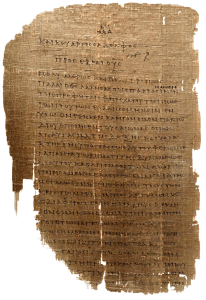
Who wrote Hebrews? The short answer: only God knows. In the following excerpt adapted from Lexham Press’ new Evangelical Biblical Theology Commentary volume: Hebrews by Thomas R. Schreiner, we see whose names have been put forward—and why the author of Hebrews probably isn’t Paul.
The authorship of Hebrews is a fascinating issue that continues to interest Christians today.
Who put forward Pauline authorship of Hebrews?
Clement of Alexandria (ca. AD 150–215) thought the letter was written by Paul in Hebrew and then translated into Greek by Luke.
Origen (ca. AD 185–253) said the thoughts are Pauline but suggested someone else made short notes and wrote up what the apostle taught and said. Origen passed on the tradition that either Luke or Clement of Rome was the writer, but he remained noncommittal on the identity of the author. Most scholars believe Origen was agnostic about the author since he wrote, “But who wrote the epistle, truly only God knows.”
David Alan Black, however, argues Origen believed Paul was the author but someone else was the penman.
Black’s interpretation of Origen should be rejected. It has been shown that when Origen speaks of who wrote the epistle he was referring to the author, not merely the secretary. Hence, the notion that Origen believed Paul was the author fails to persuade.
As time passed, however, the notion that Paul was the author gained credence, and by the third century Pauline authorship was accepted in the East.
The situation in the West was different.
Tertullian (ca. AD 155–220) suggested that Barnabas was the author, which indicates there was no inclination in the early centuries in the West to ascribe the letter to Paul.
Identifying the author as Barnabas is interesting since Barnabas was a Levite (Acts 4:36), which could explain the interest in and knowledge of priestly matters in Hebrews. Pauline authorship, however, finally triumphed in the West due to the influence of Jerome and Augustine.
Views on Pauline authorship in the Reformation and today
Pauline authorship reigned as the view of the Church until the time of the Reformation.
Erasmus inclined against Pauline authorship but said he would submit to ecclesiastical authorities since the matter was inconsequential.
Luther rejected Pauline authorship, believing that Heb 2:3 proves the book could not have come from Paul. Luther had a novel but brilliant guess regarding authorship, proposing that the book was written by Apollos.
Hebrews is beautifully written and has an Alexandrian feel, fitting with Apollos’s eloquence and Alexandrian roots (Acts 18:24). Calvin also agreed that Paul wasn’t the writer based on Heb 2:3, suggesting that either Luke or Clement of Rome penned the letter.
In the contemporary period, scholars continue to propose various authors, such as Priscilla, Silas, Epaphras, Jude, Aristion, etc. In recent years a vigorous defense of Lukan authorship has been proposed by David Allen, and there is also a significant defense of Pauline authorship by David Alan Black.
Why Paul is not the author of Hebrews. Pauline authorship should be rejected despite the attempts, both ancient and modern, to mount a defense.
First, in Paul’s 13 letters he identifies himself by name, thus the absence of a name in Hebrews renders it doubtful that Paul wrote the letter.
Second, stylistic arguments should not be relied on too heavily since the Pauline corpus is so limited. Still, the polished Greek style of Hebrews doesn’t accord with what we find in the Pauline letters.
Third, the writer separates himself from the original eyewitnesses in Heb 2:3. Paul, by way of contrast, emphasizes repeatedly his authority as an apostle of Jesus Christ and refuses to put himself in a subordinate position to the apostles and eyewitnesses. This last reason, in particular, rules out the notion that Paul was the author.
If not Paul, then who wrote Hebrews?
Once Paul is excluded, the door is pushed wide open for any number of candidates.
David Allen Black argues intriguingly for Luke, but one can only say that he has shown that Lukan authorship is possible. He has certainly not proved his thesis. The linguistic evidence is not decisive, and the differences between Hebrews and Acts call into question Lukan authorship.
Barnabas is an attractive choice since he was a Levite, and the book has an interest in all things Levitical.
Similarly, Luther’s guess that the author was Apollos is appealing, for Apollos’s eloquence accords with the letter’s elegance, and his Alexandrian background fits with the character of the letter. Many scholars have seen an affinity between Hebrews and Platonic/Philonic thought, and Alexandria was a fertile center for such thought.
But we come face-to-face here with the paucity of evidence in assigning an author.
All the theories are guesses, though some are fascinating and alluring to be sure. We don’t really know who wrote Hebrews. No theory of authorship has won the day and for good reason, for the answer to our quest lies outside the domain of historical knowledge.
Origen’s words about the author still ring true today: “GOD ONLY KNOWS WHO WROTE HEBREWS.”
***
WHEN I BEGAN MY BLOG ON HEBREWS ABOUT TWO YEARS AGO, I DID A LOT OF READING BEFORE COMPILING AN EXTENSIVE INTRODUCTION, THE MOST CHALLENGING SUBJECT BEING THE AUTHORSHIP OF THIS GREAT BOOK. THIS WEEK’S BLOG, WRITTEN BY SCHREINER – WHOSE EXPERTISE AND OPINIONS I APPRECIATE VERY MUCH – CAUSED ME TO REVISIT THE CONTROVERSIAL QUESTION ONE MORE TIME. I AGREE ALMOST ENTIRELY WITH HIS WRITING HERE. MY PERSONAL GUESS AS TO THE AUTHOR OF HEBREWS IS APOLLOS, BUT “ONLY GOD KNOWS.”
– Professor Thomas A. Rohm |


